| Kukkuripa | 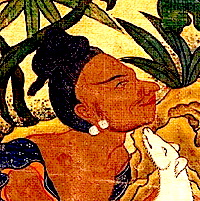 Kukkuripa Kukkuripa
Mahasiddha #34
Kukkuripa “The Dog King” ཀུ་ཀྐུ་རི་པ། (10th century CE)
A wandering ascetic, Kukkuripa found and adopted a starving dog brought it back with him to the cave where he lived and meditated. Kukkuripa’s meditation practice took him to pleasurable, psychological god realms but memories of his dog connected him back to the real world where he saw his loyal dog sad, thin, and starving. Spurning the luxury, comfort and extravagance; he returned to the cold, dark, very uncomfortable cave out of compassion for the dog. The dog then became his teacher blending his mind-stream with the deepest insight of all the Buddhas. Naropa sent Marpa to study with him and he became one of Marpa’s most important teachers, famous for his songs of realization, and a “patron saint” for all the downtrodden and oppressed. Mahasiddha #34 3 quotes |
| Layman Pang | 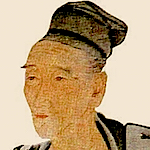 Layman Pang Layman Pang
Layman Pang 龐居士 Páng Jūshì, Hōkoji (740–808) Successful merchant, family man, celebrated lay Buddhist; like Vimalakīrti and Marpa the translator, Pang exemplifies possibilities of the highest realization and enlightenment for people in everyday walks of life without needing to live in a monastery or remote cave, without being a yogi, monk, or nun. He did however worry about his success and wealth becoming an impediment to his spiritual path and at one point loaded all his riches in a boat that he sunk in a river. He and his family then traveled around China visiting great teachers and surviving by making and selling bamboo utensils. These travels and his words were immortalized in Blue Cliff Record koans as was his daughter Ling Zhao’s words, "Neither difficult nor easy, on the hundred grass tips, the great Masters' meaning" and "Not difficult, not easy—eating when hungry, sleeping when tired." 10 quotes |
| Lin Mo Niang |  Lin Mo Niang Lin Mo Niang
Lin Mo Niang (silent girl) 林默娘 akaMa Zhou, Mazu, Matsu, Tian Hou (c. 970) "Empress of Heaven,”patron of seafarers, Confucian, Taoist and Buddhist adept, rainmaker, and Fujianese shamaness from an impoverished and uneducated fishing village where no one could read; Lin Mo Niang lived during a time of mass migrations from China’s north when refugees blended their culture with her local one. Most popular today in Taiwan but banned in Mainland China, her following called Mazuism has over 1500 temples in 26 countries, and statures as high as 139’ (42.3 meters). Equated with Guan |
| Madame Guyon | 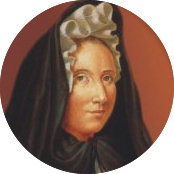 Madame Guyon Madame Guyon
Madame Guyon, Jeanne-Marie Bouvier de la Motte-Guyon (1648 - 1717)
French mystic, key advocate of Quietism, strong influence on the Quakers and other anti-materialistic Christian traditions; Madame Guyon was widowed at 28 having already borne 5 children. Advocating the ‘prayer of quiet’ and interior realization - teachings of Teresa of Avila and John of the Cross - she ran afoul of the Roman Catholic Church’s emphasis on believing in only external authority, was branded a heretic, and imprisoned in the Bastille for 7 years. Praying all the time and finding her God in every detail of life, she exemplified belief in basic goodness, the sacredness of all experience, and a genuine, European, Wu Wei tradition. 9 quotes |
| Mahatma Gandhi | 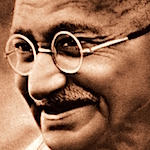 Mahatma Gandhi Mahatma Gandhi
Mahatma Gandhi (1869–1948) Leader of India’s independence movement, non-violent civil disobedience advocate, major inspiration for Martin Luther King Jr. and Nelson Mandela; Gandhi followed in his Jain tradition of fasting, meditation and vegetarianism. After an arranged marriage at 13, he studied law in England but was so introverted and shy, he froze during his first cross-examination and couldn’t say anything. Not being able to find work in India, he moved to South Africa where in a Rosa-Parks type moment was thrown off a train for refusing to move to the back. This led to his lifetime passion for fighting prejudice, discrimination, and injustice – political change in S. Africa, Indian independence, and many attempts to establish peace between Hindus and Muslims. 27 quotes |
| Malala Yousafzai | 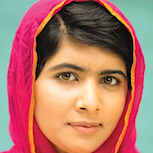 Malala Yousafzai Malala Yousafzai
Malala Yousafzai ملالہ یوسفزئی (1997 - ) Pakistani activist, the youngest Nobel Prize laureate at 17, "the most famous teenager in the world,” and listed by Time magazine 3 times as one of the world’s most influential people; Malala grew up in a the Swat Valley where the girls were banned from schools. Working hard for the education of women around the world, she was shot by a Taliban assassin in 2012 but thena group of 50 leading Muslim clerics issued a fatwa against the people who tried to kill her. Her book was banned by a 152,000-member Pakistan School Federation and though she is still broadly criticized in Pakistan for being too pro-Western; she didn’t hesitate when meeting with President Barack Obama and his family to challenge the use of drone strikes. 8 quotes |
| Mekopa | 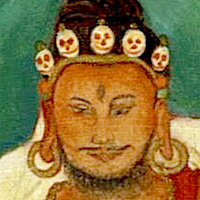 Mekopa Mekopa
Mahasiddha #43
Mekopa, མེ་ཀོ་པ། Guru Dread-Stare (11th century)
Always cheerful and kind Bengali food merchant taken as a student by a yogin customer, Mekopa saw into the vastness of his own mind, the uselessness of chasing desires, and harmfulness of action based on duality. His realization led him far beyond the limits of status quo, conventional social standards and behavior; into a lifestyle unbound by concern for people’s opinion, wandering about a cremation ground “like a wild animal” and into towns like a mad saint with dreadful, staring eyes. Mahasiddha #43 5 quotes |
| Napoleon Bonaparte | 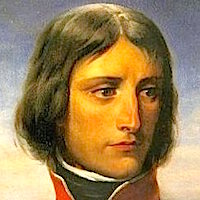 Napoleon Bonaparte Napoleon Bonaparte
Napoleon Bonaparte (1769 – 1821)
Called by historians everything from a megalomaniac worse than Hitler to an enlightened monarch responsible for creating some of the best political and legal systems in the modern world; Napoleon became a French general when only 24, a national hero at 26, and – attributing his success to meditation - one of the most successful commanders in all of history. Father of the European common market, his Napoleonic Code became a foundation for legal systems used today by 1/4 of the world's population, 70+ countries in Europe, the Americas and Africa. Inspired by the liberal vision of the French Revolution, he helped end feudalism, encouraged science and the arts, institutionalized equality before the law, property and religious rights, meritocracy, and our modern educational system. Excommunicated by the Catholic Church, he abolished the Spanish Inquisition and emancipated from ghettos Jews and Protestants in Catholic countries, Catholics and Jews in Protestant countries.
31 quotes |
| Nisargadatta Maharaj | 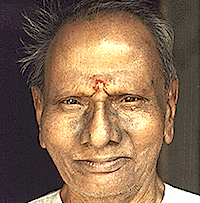 Nisargadatta Maharaj Nisargadatta Maharaj
Householder guru of non-duality
Nisargadatta Maharaj (1897 – 1981)
An Indian Guru of nondualism from a householder lineage; Nasargadatta began in life by opening a small store that mainly sold beedis (leaf-rolled cigarettes). He soon expanded this into a string of eight retail shops, married, and had 4 children. After meeting a guru and practicing a sadhana, he traveled across India alone until he realized that "nothing was wrong anymore,” returned home and stayed there maintaining his business and teaching. His exposure greatly expanded when North American and European followers discovered him but he remained unseduced by materialism and continued living in the most simple and unassuming way. 17 quotes |
| Orghina Khatun | 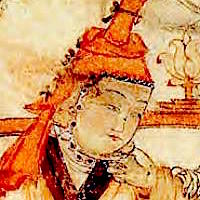 Orghina Khatun Orghina Khatun
Orghina Khatun ( - 1261)
Daughter of the Oirat ruler, niece of Mongke Khan, and incorporated into Genghis Khan’s family lineage by marriage; Orghina Khatun became the first and only woman that ruled over the Chaghataid Khanate. Beautiful, wise, and pragmatic; her fortunes frequently rose and fell as she maintained her influence and power base by frequently switching sides, changing allegiances and religions as needed. She maintained supreme authority for over 15 years during a time when intense and violent struggles between leaders trying to take Genghis Khan’s place as Great Khan created one of history’s most chaotic political periods. |
| Oscar Wilde | 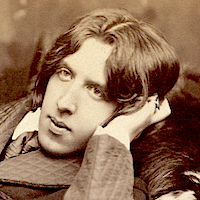 Oscar Wilde Oscar Wilde
Oscar Wilde (1854 - 1900)
Prolific Irish poet, writer, journalist, and one of the most successful playwrights of his time; Wilde rebelled against his moralistic, Victorian environment with an “unequivocal inclination toward the unconventional” favoring passion and sensual pleasure. Strongly influenced by his teacher, John Ruskin, he transformed his more hedonistic tendencies into deep social concerns and wrote against decadence, duplicity, and libel. Married and with two sons, his writings went against popular opinion by describing women as creative and intelligent. His liaisons with men however led to a trial for homosexuality, incarceration, a severe injury in prison after collapsing from illness and hunger, and later death in extreme poverty. In many ways, his life seems to have exemplified his famous aphorism, “No good deed goes unpunished.” 42 quotes |
| Parmenides | 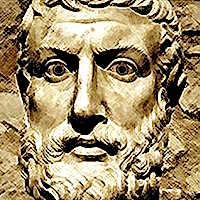 Parmenides Parmenides
Grandfather of Western philosophy
Parmenides of Elea Παρμενίδης ὁ Ἐλεάτης (c. 540 - 450 BCE)
Father of Western logic, grandfather of Western philosophy, major influence on the development of science, promoter of the most paradoxical (contrary to appearances) vision of reality, and venerated by Plato and Aristotle; Parmenides taught that our experiences of “reality” are illusory, that the profound oneness of life makes change impossible, existence timeless, and that nothing either dies or is born. In The Way of Opinion, he explains the world of appearances, in which one's sensory faculties lead to conceptions which are false and deceitful. In The Way of Truth, he describes a mystical experience of absolute, unborn reality. These categories parallel our theme of “the words or the sense.” 9 quotes |
| Paulo Lugari |  Paulo Lugari Paulo Lugari
Paulo Lugari (1944 - )
Regenerator of a rain forest in a rain-leached, desiccated area without trees, creator of a village (Gaviotas) in a nearly uninhabited area later called by the United Nations “a model of sustainable development,” and known as“the inventor of the world;” Paulo Lugari represents one of the most inspiring stories of human goodness and potential. In 1971 his group of idealistic, challenge-seeking engineers and visionaries moved to a desolate, semi-populated region of Colombia, SA. Today, that once barren land has regenerated a rain forest with millions of trees, sprouted 247 plant species, and established an aquifer that supplies water to over 45,000 people. One of the most hopeful environmental success stories ever told, Gaviotans successfully built a prototype of sustainability in an area ravaged by political terror. Every family has free housing, community meals, and schooling. There are no weapons, no police, no jail or rules, yet they are an oasis of peace. 9 quotes |
| Rabbinic Sages | 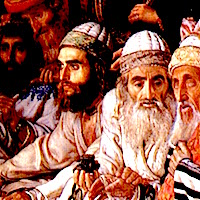 Rabbinic Sages Rabbinic Sages
Rabbinic Sages (20 – 200 CE)
Academies in Galilee, Tiberias and Caesarea; teachers of the Mishnah, transmitters of the Jewish traditions passed down for centuries orally, and written down during the first 200 years of this millennium; these sages taught and recorded commentaries and reflections on the Hebrew Bible. Their writings became the foundation of Jewish law, ethics, philosophy, and customs eventually evolving into over 6,200 pages. 14 quotes |
| Ramakrishna | 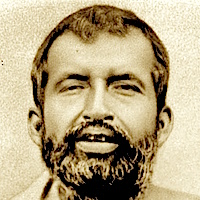 Ramakrishna Ramakrishna
Ramakrishna Paramahamsa (Bengali: রামকৃষ্ণ পরমহংস (1836 – 1886)
Indian mystic, yogi, inspiration for the 19th–20th century Bengali Renaissance; Ramakrishna became a strong revitalizing influence on Indian culture. His "social service gospel,” disciples like Vivekananda, and organizations do major philanthropic work in education, health care, disaster relief, rural management, and in eliminating tribal welfare. Steeped in Hindu philosophy and practices, he also initiated into and practiced Islam and did the same with Christianity teaching ‘All religions as true.’ His impact on thought leaders extended from names like Gandhi and Nehru to westerner ones like Tolstoy, Dvorak, and Philip Glass. 12 quotes |
| Saul Alinsky | 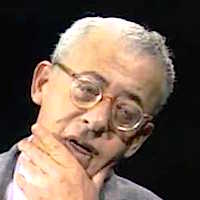 Saul Alinsky Saul Alinsky
Saul Alinsky (1909 – 1972) “Founder of modern community organizing,” “creator of a backyard revolution in cities across America,” champion of the poor and powerless; Alinsky became a strong influence on Cesar Chavez, Hillary Clinton, Barack Obama and Dolores Huerta but his methods and strategies were also studied and used by Tea Party organizers. Dedicating his own work to improving the living conditions in poor communities, he was active in the labor movement, poverty alleviation across the USA, in black ghettos, and California barrios. Reviled and banned by establishment politicians but admired and imitated by counterculture-era organizers; he was described by William F. Buckley Jr. as an “organizational genius,” by Adlai Stevenson as “a most faithfully reflect[ion] our ideals of brotherhood, tolerance, charity and dignity of the individual,” and according to Time magazine he “altered democracy.” 22 quotes |
| Sun Bu'er | 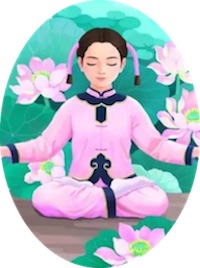 Sun Bu'er Sun Bu'er
Sun Bu'er 孫不二 (1119 – 1182)
Taoist priestess, one of the Seven Masters of Quanzhen, mother of 3, beautiful, intelligent, wealthy, and known as “Clear and Calm Free Human;” Sun Bu'er founded the Purity and Tranquility School and wrote many famous poems and secret Taoist texts. She developed a “science of essence” concerned with psychologically going beyond the influence of both inherited personality and learned conditioning as well as a “science of life” developing ways to increase health and energy. Destroying her beauty to prevent male attack, she became the only woman included in the famous Taoist “Seven Perfected,” and through the ages a role model and inspiration for women following a spiritual path. 8 quotes |
| Trisong Detsän | 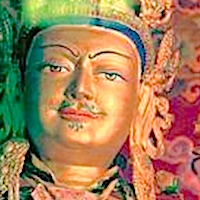 Trisong Detsän Trisong Detsän
Trisong Detsun, Ralpacan, Tritsuk Detsen, ཁྲི་གཙུག་ལྡེ་བཙན (806 - 838 CE) One of the famous three “Dharma Kings” who brought Buddhism to Tibet and extended the Tibetan empire to its largest size encompassing parts of modern-day India, Nepal, Khotan, and a large territory in modern China including Sichuan, Xinjiang, and Gansu provinces; Trisong Detsun negotiated a peace treaty with the Uyguhurs in the north and with the Chinese in the east. He brought to Tibet hundreds of scholars, craftspeople, and translators who developed Tibetan literature, a Sanskrit-Tibetan dictionary, and translations of the Tripitaka, Buddhist commentaries, and ancient Tantras. He introduced weight and measurement systems from China, monastic religious organization from India, and set up a system of patronage for priests assigning support from 7 families for each Buddhist monk. |
| Vyālipa | 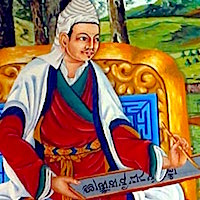 Vyālipa Vyālipa
Mahasiddha #84
Vyalipa བྱཱ་ལི་པ། “The Courtesan's Alchemist (10th century) After 13 years and the loss of all his wealth, alchemist and searcher for the “elixir of immortality,” Vyalipa gave up his dedicated quest, threw his manual in a river, and becoming a wandering beggar. Later a prostitute who found the book as well as the missing ingredient Vyalipa was unsuccessfully looking for, paid him to renew his quest. They discovered elixir but refused to share it and became imprisoned in a deathless, blissful but empty psychological god realm. According to Taranatha though, Vyalipa later returned to the world, shared the secret elixir with Carpati, and became a famous realization-song singer-songwriter. Mahasiddha 84 1 quote |
| W. E. B. Du Bois | 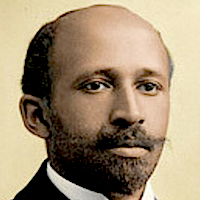 W. E. B. Du Bois W. E. B. Du Bois
W. E. B. Du Bois, William Edward Burghardt (1868 – 1963)
First African American to earn a doctorate (Harvard), co-founder of the NAACP, historian, peace activist,sociologist, and civil rights activist for minorities world-wide; Du Bois led the Niagara Movement which insisted on equal rights rather than accepting Southern white proposals that traded Black political freedoms for economic and educational opportunities. He protested against the commonly accepted lynchings of his time, wrote a foundational set of African-American essays, and one of the first scientific works in the new field of sociology. Blaming capitalism for causing racism, he proposed and promoted many issues that became law in the US Civil Rights Act, criticized American churches for being primary supports of discrimination, and worked hard for nuclear disarmament. 12 quotes |


 Kukkuripa
Kukkuripa Layman Pang
Layman Pang Lin Mo Niang
Lin Mo Niang Madame Guyon
Madame Guyon Mahatma Gandhi
Mahatma Gandhi  Malala Yousafzai
Malala Yousafzai Mekopa
Mekopa Napoleon Bonaparte
Napoleon Bonaparte Nisargadatta Maharaj
Nisargadatta Maharaj  Orghina Khatun
Orghina Khatun Oscar Wilde
Oscar Wilde Parmenides
Parmenides Paulo Lugari
Paulo Lugari Rabbinic Sages
Rabbinic Sages Ramakrishna
Ramakrishna Saul Alinsky
Saul Alinsky  Sun Bu'er
Sun Bu'er Trisong Detsän
Trisong Detsän Vyālipa
Vyālipa W. E. B. Du Bois
W. E. B. Du Bois